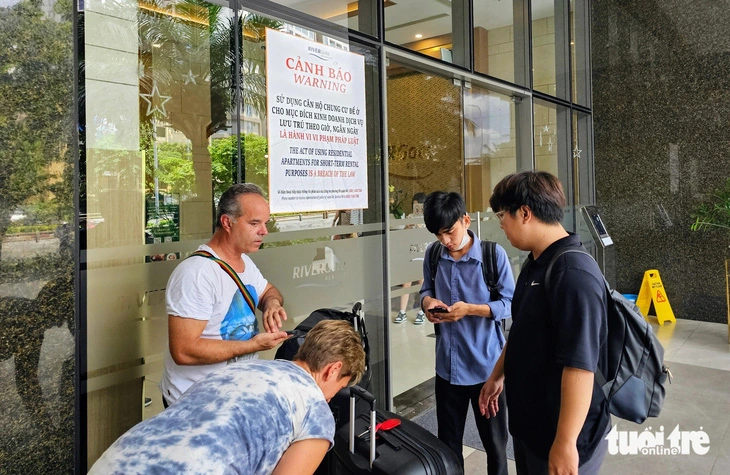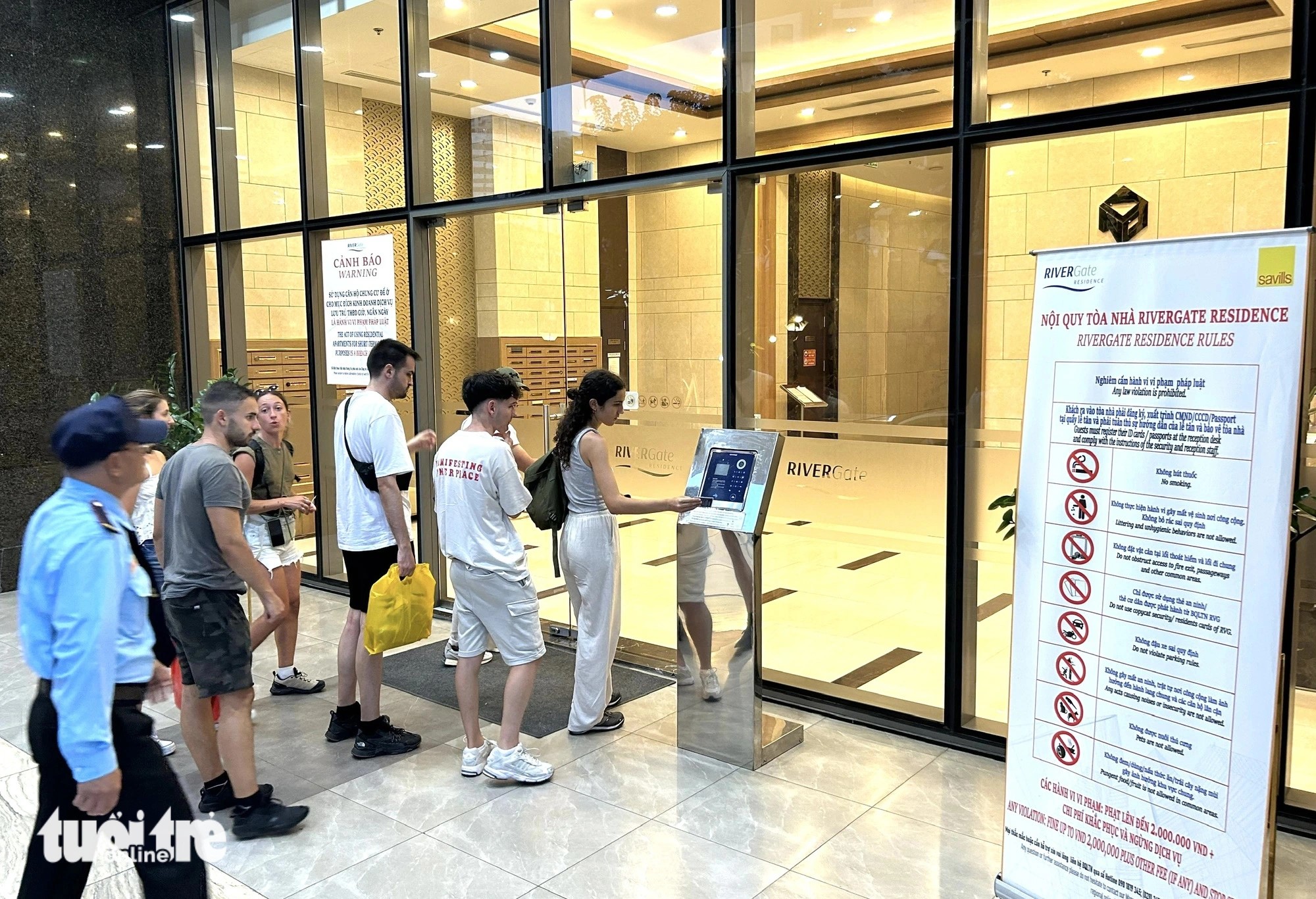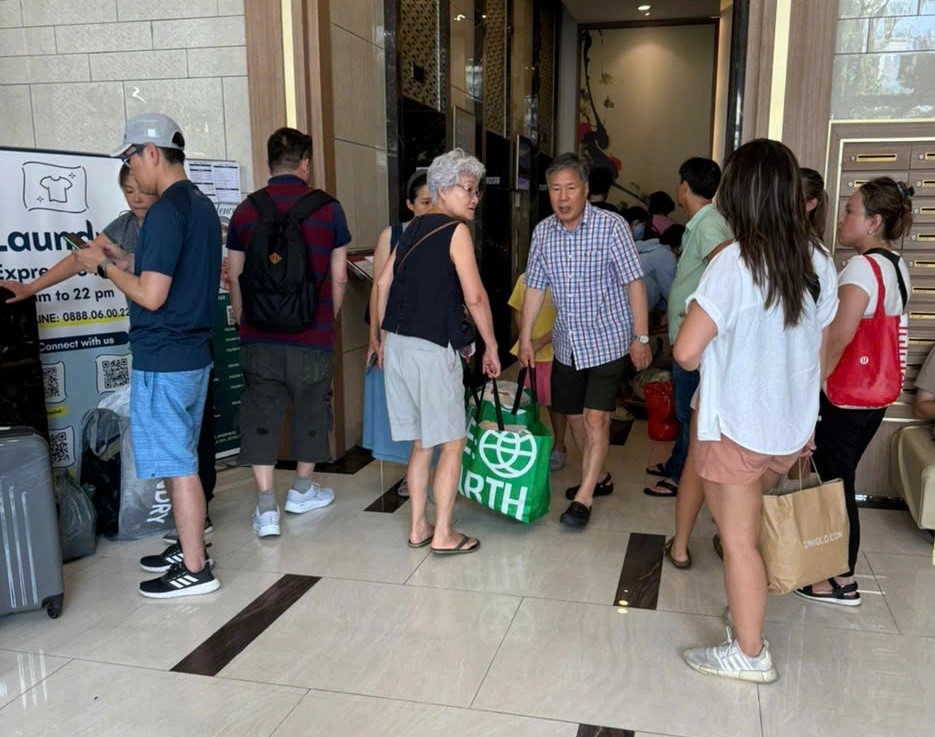Airbnb's short-term rental business model is still forbidden in many apartment complexes in Ho Chi Minh City, placing those who have substantial financial resources in a tough situation.
As the popularity of Airbnb rentals grows, these short-term stays have led to tensions with long-term residents.
Recently, several apartments in Ho Chi Minh City have put up signs warning against renting out flats by the day and hour.
In extreme situations, some properties have forbidden Airbnb rental guests from entering the building, ruining vacations and tourism plans.
Nguyen Thuong Hoai from Thu Duc City, Ho Chi Minh City revealed that she invested billions of Vietnamese dong to buy a unit at the River Gate Resident apartment complex in District 4. (VND1 billion = US$40,201)
She also rented other units in the building to sublease and assisted acquaintances in managing them. Presently Hoai manages approximately 15 units as an Airbnb host.
However, during the last two months, apartment building management boards and building management teams in Binh Thanh District and District 4 have begun to rein in Airbnb services, even placing warning signs indicating that "the use of residential apartments to operate hourly or short-term rental services is against the law," prompting concern.
According to Hoai, Airbnb is popular with both international and domestic guests since the rental fee for each apartment is just approximately VND1.2 million ($48) per day, and a unit can accommodate 4-5 people while offering access to all household amenities.
However, these stays have produced certain challenges and inconveniences for long-term apartment tenants, such as rental guests visiting the incorrect unit, pushing the wrong doorbells, and in some cases, getting drunk, banging doors, and making noise late at night.
Long-term tenants also take issue with rental visitors having access to building facilities like a fitness center and swimming pool.
Hoai stated that with the de-facto ban in place, the bigger impact would be felt by local investors, many of whom have spent a significant amount of money acquiring and furnishing these units and are now unable to recoup their investment.
"We are ready to pay taxes, comply with government regulations, and prevent guests from using the gym and pool to minimize the impact on apartment residents, as long as there is a clear legal framework to comply with," he said.
Similarly, Thanh Huong, a District 4 citizen, claimed that the prohibition on short-term rental services in Airbnb units is causing dozens of hosts to struggle.
Many people who acquired units for commercial purposes did so through bank loans and spent hundreds of millions of dong on furniture now face considerable difficulties, including the worst-case scenario of losing it all. (VND1 million = $40)
Huong acknowledged "the frustrations of apartment residents," adding that "completely banning business activities like this will impact investors, among whom are those who've bought multiple apartments to operate under the Airbnb model. In the case of being [formally] banned from doing business, they'd be forced to find people who need long-term rentals, but the difficulty is that there are few tenants looking for apartments with 2-3 bedrooms."
According to property owners using the Airbnb model, the profit per unit is approximately VND5-6 million ($200-250) per month after they subtract service and cleaning charges.
Hosts who own multiple units might earn a profit of up to VND35-40 million ($1,500-1,700) per month after deducting expenses.
|
|
| Residents and guests enter an apartment building in District 4, Ho Chi Minh City. Photo: T.T.D. / Tuoi Tre |
Management vs. prohibition
Speaking with Tuoi Tre (Youth) newspaper, a property developer in Ho Chi Minh City indicated that many people are purchasing units in District 1 and District 4 for subleasing or operating under the Airbnb model.
In some buildings, the Airbnb business model accounts for 60 percent of the flats. However, the developer has no say in how the apartments are used once owners, apartment management boards, and building management teams take control.
Tran Minh Ai, a senior director from Savills, an international real estate service provider in Ho Chi Minh City, noted that short-term rental services are quite popular in apartment complexes in District 1, District 3, District 4, and Binh Thanh District.
Ai expressed concerns that the Airbnb model negatively impacts the quality of life for long-term apartment tenants by increasing the use of shared facilities, such as elevators, swimming pools, and fitness centers.
The influx of short-term renters places additional strain on these amenities, potentially diminishing the experience for permanent residents.
The 2023 Housing Law explicitly prohibits the following actions in the management and use of apartment buildings: "Intentionally changing the occupancy or use purposes of common property of apartment buildings; using dwelling units for purposes other than residential; altering or damaging load-bearing elements; separating or splitting dwelling units without the permission of competent authorities."
The prohibition on "using apartment units for purposes other than residential" was previously included in the 2014 Housing Law.
|
|
| Residents and tourists wait at the elevator at an apartment complex in Ho Chi Minh City. Photo: Thanh Tu / Tuoi Tre |
What does the community say?
The head of an apartment management team stated that clear direction is required from competent authorities, specifically whether Airbnb is permitted to operate.
If Airbnb is allowed, hosts should incur higher service fees due to the greater frequency with which they use shared facilities and clear management restrictions.
Le Hoang Chau, chairman of the Ho Chi Minh City Real Estate Association, said that when apartments are rented out as travel accommodations under the Airbnb model, hosts should be required to register their business, pay taxes, and accept responsibility for ensuring tenant compliance with apartment regulations.
Nguyen Hoang Lan, a tenant in Binh Thanh District, suggested that authorities carefully regulate Airbnb services in apartment complexes, emphasizing that these short-term rentals significantly impact the lifestyle and living spaces of residents, especially during weekends.
Lan argued that robust legal frameworks are necessary to mitigate conflicts between long-term residents and property owners operating Airbnb units.
Like us on Facebook or follow us on X to get the latest news about Vietnam!






















































